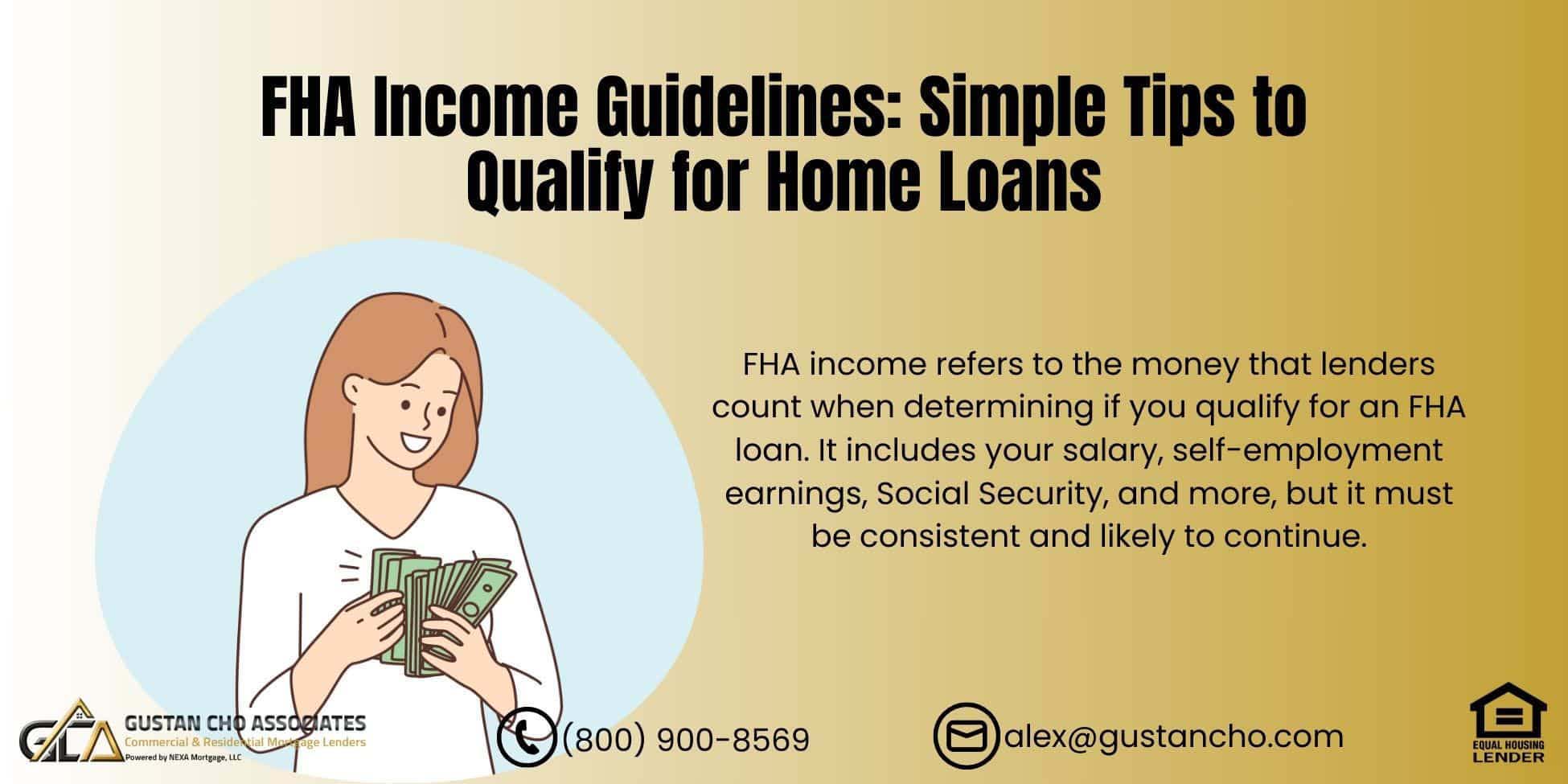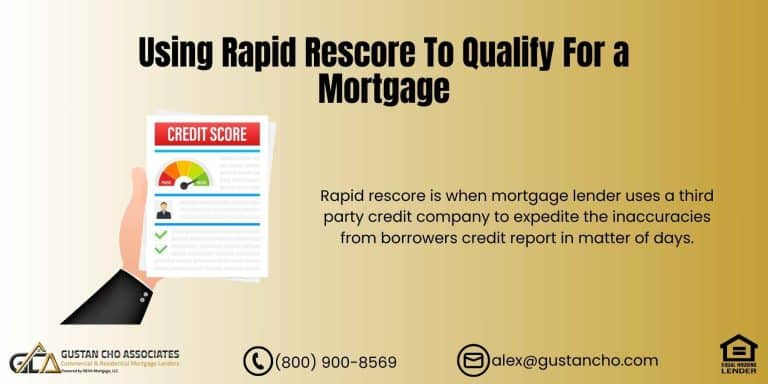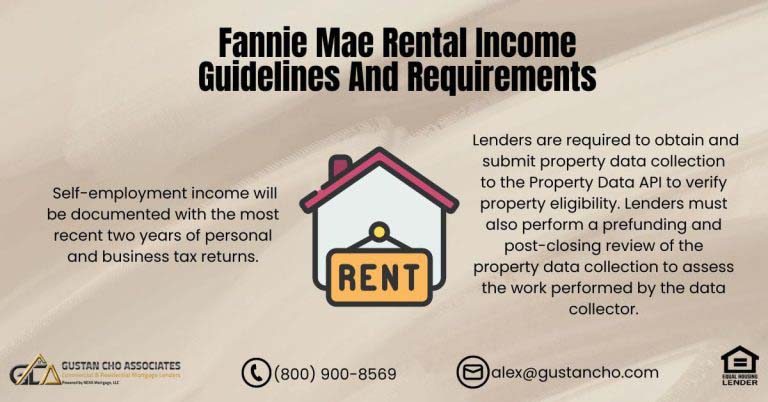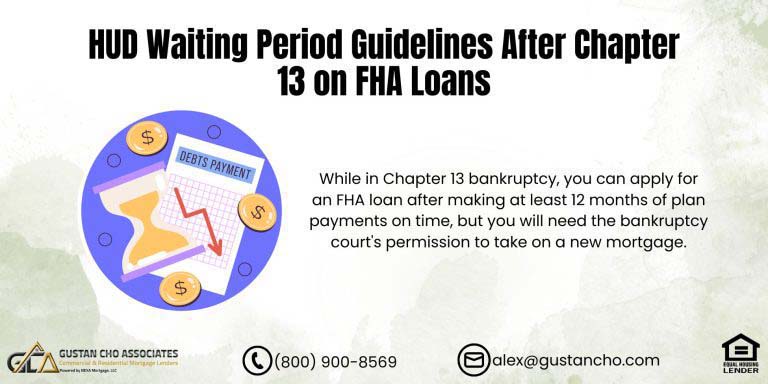FHA Income Mortgage Guidelines for 2024: What You Need to Know
Are you dreaming of owning a home but worried about your income? The good news is that FHA loans offer some of the most flexible guidelines, making homeownership within reach for many borrowers. Whether you’re self-employed, earning overtime, or receiving Social Security, FHA income guidelines are designed to be inclusive and fair.
In this guide, we’ll walk you through the various types of income that can qualify for an FHA loan and the documentation you’ll need to get approved. By the end, you’ll know how to maximize your income to qualify for your dream home.
What Is FHA Income?
When you’re going for an FHA loan—a special kind of loan backed by the government—it’s not just about how much money you rake in. What matters is how the folks lending you the money, like banks or mortgage companies, look at your income. They call it “FHA income” because it follows rules set by a big agency called HUD.
These rules help you determine if your money is steady and enough to keep up with your house payments. They want to make sure buying a house doesn’t stretch your budget too thin.
But here’s the thing: not all the money you earn counts the same. The lenders have this idea of “qualifying income.” That’s the cash they think will keep coming in consistently. So, even if you earn a decent amount, they might adjust how they count it based on their rules. Getting your head around this makes a difference when applying for an FHA loan.
Ready to Own a Home? See If You Qualify for an FHA Loan Today!
Contact us today to find out if you qualify for an FHA loan and start your home buying journey.
Types of Income That Can Qualify for an FHA Loan
What counts as income is a big deal when you’re looking to get an FHA loan. Think of it as all the money you make that the bank can say, “Yep, we’ll count that,” when you’re trying to get a loan. Let’s break it down into everyday language, focusing on the kinds of money that could help you qualify. This is pretty much your guide to FHA income.
Regular Job Income
For most folks, this is your 9-5 paycheck. If you’re on a salary, showing your income is as easy as handing over your recent pay stubs and the W-2 forms from the last two years. If you get paid by the hour, the bank will look at what you made on average over the past two years. Got a raise recently? They might just focus on what you’ve been making since the bump up.
Self-Employment Income
If you’re your own boss, things get a bit more detailed. You’ll need to show your tax returns from the last two years to prove your income is steady or improving. Banks will look at what you earned after you’ve taken off your business expenses, but they’ll add back stuff like depreciation to get a real sense of your cash flow.
Overtime, Bonus and Commission Income
Money from working extra hours, bonuses, or commissions can count, but only if you’ve been getting this extra cash regularly for two years. The bank wants to see that this isn’t a one-off but something you can count on. If you’ve got less than two years under your belt, some lenders might still give it a thumbs up if your employer says it’s likely to keep happening.
Pension and Social Security Income
Retirement doesn’t disqualify you from getting a mortgage. If you receive a pension or Social Security benefits, this income can be used to qualify. Furthermore, non-taxable income can be “grossed up” by 25%. If you receive $1,000 monthly, your lender can consider it $1,250 when calculating your qualifying income. This gives you a better chance of meeting the required income thresholds.
Disability Income
Whether from Social Security, VA benefits, or private insurance, disability income can be used to qualify for an FHA loan. The key requirement is showing that the income will continue for at least three years. You’ll need your award letter and proof of recent deposits. If your disability is temporary, lenders may still consider it if you plan to return to work and have a letter from your employer confirming this.
Part-Time or Seasonal Work
Part-time or seasonal work can also count toward your qualifying income, provided you’ve maintained this income for at least two years. Some lenders may consider this income if you’ve worked in the same role for a year and can show it’s likely to continue. However, seasonal income is only counted if it’s consistent year after year, like working at a ski resort every winter.
Rental Income
Do you own investment properties? Rental income can help boost your qualifying income for an FHA loan. You’ll need to provide a lease agreement and proof that the property has been rented for at least a year. Lenders usually count 75% of the gross rental income to account for potential vacancies and maintenance costs. Boarder income, such as rent from a family member, can also be counted if it’s documented on your tax return.
Alimony or Child Support
You can use alimony or child support payments to qualify for an FHA loan if they will continue for at least three years. You must provide the court order that mandates the payments and proof that you have consistently received them. Remember that child support is non-taxable, so it can also be grossed up by 25%.
Investment Income
Income from dividends, interest, and capital gains can also be considered, but it’s tricky. You’ll need to show two years of tax returns and prove that the income is stable and expected to continue. If your investment income comes from capital gains, it must be consistent—windfall gains won’t count.
So, when it comes to FHA income, it essentially refers to any funds that you receive and can be verified by the bank. It’s important to demonstrate that you have a steady income stream to increase your chances of qualifying for a loan.
FHA Income Requirements and Debt-to-Income Ratio (DTI)
When buying a house with an FHA loan in 2024, how much money you make (FHA income) and how much you owe plays a big part. The FHA pays a lot of attention to your debt-to-income ratio (DTI). This DTI figure is a way to measure how much of your income will pay off debts each month.
To get the thumbs up for an FHA loan, you generally need your DTI to be 43% or less. Think of it like this: for every $100 you make, you shouldn’t be spending more than $43 on debts. But, if you’ve got some good things going for you, like a big chunk of money for a down payment or a lot of savings, some lenders might be okay with a higher DTI.
Let’s break down the DTI into two kinds:
- Front-End Ratio: This is all about your house costs. It looks at what part of your gross monthly income before taxes goes towards your home costs, like your mortgage, property taxes, and homeowners insurance. FHA likes to see this number below 31%.
- Back-End Ratio: This one’s broader. It considers not just your house costs but all your month-to-month debt payments. This includes your mortgage, car payments, credit card debt, and student loans. The goal is to keep this under 43% for FHA approval, though some lenders might let you slide up to 50% if you have strong reasons to back it up.
So, when you’re looking into FHA loans, remember that it’s not just about how much you earn but also how you manage your debt compared to that income.
Lenders don’t just take your word for your income—they verify it meticulously. Here’s how they typically calculate your FHA income:
- Salaried Employees: Your lender will use your gross income from your W-2s and recent pay stubs. If you’ve had a recent salary increase, they might average your income over the last two years or use your most recent income if it’s higher.
- Hourly Employees: If you work a consistent schedule, lenders will multiply your hourly wage by the weekly hours you work. If your hours vary, they will average your income over the past 24 months.
- Self-Employed Borrowers: Lenders will average your net income from the last two years of tax returns. They’ll use the lower year’s income if your income is declining.
- Bonus, Overtime, and Commission: Lenders will average your income from the last two years unless your income has decreased significantly.
- Non-Taxable Income: Lenders gross up non-taxable income by 25% to reflect the equivalent taxable income.
- Other Income Sources: For investment income, rental income, or income from alimony and child support, lenders will carefully review your documentation and might apply additional calculations to determine how much of that income they can count.
Wondering If You Qualify for an FHA Loan? We’re Here to Help You Get Approved!
Contact us today to find out how you can qualify for an FHA loan and take the next step toward homeownership.
Smart Moves to Boost Your FHA Income Approval Odds
Boosting your FHA income isn’t just about making more money. It’s about showing your money smartly. Here’s how to do it in simple steps:
- Keep All Your Papers Handy: Before you talk to lenders, grab your tax papers, recent pay slips, bank details, and any other important papers. Lenders want to see all of this to check your income.
- Explain Any Gaps in Employment: Do you have gaps in your job history? Be ready to chat about them. If you were studying, taking care of someone, or sick, just be honest and, if you can, show some proof.
- Consolidate Your Income Sources: If you’re making money from different sources, organize all that information. Showing all your income properly can help your case.
- Improve Your Credit Score: A better credit score can make lenders less worried about small issues with your income details.
- Work with a Savvy Loan Officer: A loan officer familiar with the details of FHA loans can assist you in organizing your application to enhance your documented income.
Remember, it’s all about showing your income in the best light for that FHA loan!
The Importance of Working with an FHA-Savvy Lender
The quality of FHA lenders can vary, and not all are the same. Choosing a lender who understands FHA guidelines inside and out can make a difference in whether your loan gets approved. At Gustan Cho Associates, we specialize in FHA loans and have helped countless borrowers navigate complex income scenarios.
Our team goes the extra mile by performing a Verification of Employment (VOE) upfront. This removes much of the guesswork and ensures we can count every penny of your income. We also offer TBD underwriting, which allows us to approve your income before you even find a home. This way, you know exactly how much you can afford before you start house hunting.
What to Expect in 2024
Looking ahead to 2024, if you’re considering jumping into the housing game, it will still be quite the competition. Especially for first-time buyers, or if your credit score isn’t top-notch, you’re probably looking at FHA loans as your go-to option. The cool thing is that FHA’s been tweaking its rules to make it easier for more people to enter the door. Getting the scoop on these changes is key if you want to up your chances of getting an FHA loan.
So, one change worth a shout-out is how FHA deals with income from your hustle if you’re your own boss. In the past, if you were an entrepreneur, it could be tough to show the type of steady income lenders love. But now, FHA’s a new way of looking at it that might work in your favor.
Also, for those making some cash in ways that the taxman doesn’t get a piece of – think Social Security or disability benefits – there’s this thing where FHA adds a bit extra (like 25% more) when they calculate your FHA income. That’s a pretty sweet deal because it helps you look better on paper, money-wise.
These changes are designed to make it easier to qualify for an FHA loan by improving how lenders view income. Keep an eye on these updates if you want to boost your game plan for snagging a home in 2024.
How to Get Started
Looking to buy a home? The first step is to understand how your income fits FHA guidelines. Our team at Gustan Cho Associates is here to help every step of the way. If you are at the beginning of your exploration or prepared to receive pre-approval, we can respond to your inquiries and assist you through the process.
Contact us today at (800) 900-8569 or email Alex Carlucci at alex@gustancho.com to schedule a consultation. Let’s work together to make sure every dollar you earn counts toward your dream of homeownership.
Final Thoughts
Understanding FHA income guidelines can feel overwhelming, but it doesn’t have to be. You can position yourself for success by knowing what types of income qualify, how lenders calculate your earnings, and the documentation you need. Remember, FHA loans are created to help more people afford to own a home, so don’t allow any concerns about your income to stop you.
With the right guidance, your dream home could be closer than you think. Let’s make 2024 the year you turn those dreams into reality.
FAQs – FHA Income Guidelines: Simple Tips to Qualify for Home Loans:
- 1. What is considered FHA income when applying for a loan? FHA income refers to the money that lenders count when determining if you qualify for an FHA loan. It includes your salary, self-employment earnings, Social Security, and more, but it must be consistent and likely to continue.
- 2. Can self-employment income qualify for an FHA loan? Yes, self-employment income can qualify if you have at least two years of tax returns showing steady or increasing earnings. Lenders will look at your net income after deductions and may add depreciation.
- 3. How does FHA calculate income from overtime or bonuses? FHA lenders will consider overtime or bonus income if you’ve received it for at least two years. They typically average the income over 24 months unless there’s been a significant drop.
- 4. Can I use Social Security income to qualify for an FHA loan? Social Security income can be utilized to meet the requirements for an FHA loan. Non-taxable Social Security income can also be enhanced by 25%, providing you with more qualifying income.
- 5. Does rental income count as FHA income? Yes, rental income can be used as FHA income if the property has been rented for at least a year. Lenders usually count 75% of the gross rental income to allow for vacancies and expenses.
- 6. What debt-to-income ratio (DTI) do I need for an FHA loan? Typically, an FHA loan requires a DTI ratio of 43% or less. Nevertheless, certain lenders permit a higher DTI if you possess compensating factors such as a substantial down payment or solid savings.
- 7. Can I use part-time or seasonal income to qualify for an FHA loan? Yes, part-time or seasonal income can count if you’ve consistently earned it for at least two years. Some lenders may consider it after one year if it’s likely to continue.
- 8. Is child support or alimony counted as FHA income? Child support or alimony can be counted as FHA income if it’s court-ordered, consistently received, and expected to continue for at least three years.
- 9. How do lenders verify my FHA income? Lenders verify your FHA income by reviewing your pay stubs, W-2s, tax returns, bank statements, and other relevant documents. They ensure that your income is stable, consistent, and sufficient to cover your mortgage.
- 10. What can I do to improve my FHA income qualification? To improve your FHA income qualification, keep all documentation organized, explain employment gaps, consolidate income sources, improve your credit score, and work with a knowledgeable loan officer who understands FHA guidelines.
If you have any questions about FHA income, please contact us at 800-900-8569. Text us for a faster response. Or email us at alex@gustancho.com. The team at Gustan Cho Associates is available 7 days a week, on evenings, weekends, and holidays.
This blog about FHA Income Guidelines: Simple Tips to Qualify for Home Loans was updated on August 26th, 2024.
Want to Qualify for an FHA Loan? Let’s Get You on the Path to Homeownership!
Reach out today to see how we can help you qualify for an FHA home loan.









